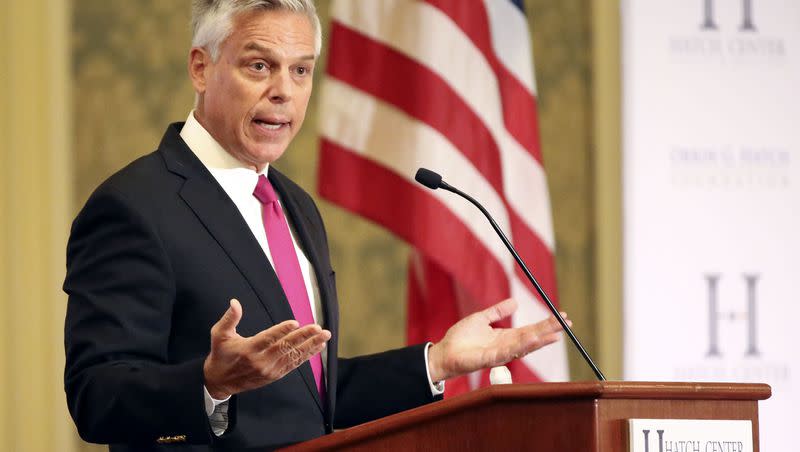Opinion: Why the group ‘No Labels’ is suddenly getting labeled

- Oops!Something went wrong.Please try again later.
Political irony can be rich.
The self-proclaimed commonsense group No Labels is now being labeled.
Why? Because, after a decade of trying to find consensus solutions to Washington’s biggest problems (it formed the problem-solvers caucus in the House), it is now focusing on accumulating its own political power.
At what was billed as a commonsense town hall in New Hampshire last week, Sen. Joe Manchin, D-W.Va., and former Utah Gov. Jon Huntsman Jr., found themselves fielding questions about the group’s intentions to present a third-party presidential ticket for 2024, as the Deseret News reported.
Manchin said, “I’m not here running for president tonight,” but coyly added he wouldn’t run unless he intended to win. The town hall was used as an event to unveil the group’s official position paper on 30 separate issues, and the group isn’t shy about its intention of getting a presidential ticket on ballots in all 50 states.
Huntsman, who ran as a Republican in 2012, was less enthusiastic about his own desires to be a part of such a ticket. But as he told me last week, both candidates were surprised by how many people showed up for the town hall.
Third party candidates don’t win. At least they haven’t. But with recent presidential elections being decided by the width of a hair, a formidable challenge could affect the outcome.
A recent NBC poll found 45% of Democrats saying they would consider voting for a third-party candidate, while only 34% of Republicans felt the same.
Washington apparently noticed the town hall crowd and the polls. Some Democrats are openly worried about the centrist group as a threat to President Joe Biden’s reelection chances. Adhesive is being prepared for the “spoiler” label.
Politico said the progressive MoveOn and the centrist Third Way will be warning Democratic leaders in the Senate about the risk No Labels could pose to Biden if Manchin, known as a centrist Democrat, launches a presidential bid.
Related
What Manchin and Huntsman said about running for president for a third party
A third party got on the ballot in Arizona for 2024. Could they change the outcome of the election?
If No Labels wasn’t a threat, no one would care.
But while the Beltway begins to tune up its insult-hurling label machine, regular Americans ought to take notice. A No Labels candidate might actually talk about things the mainstream candidates want to ignore.
Things such as the pending demise of Social Security or a national debt that threatens to eat up 40% of all federal revenues in interest payments alone within the next 30 years.
Biden goaded Republicans during his State of the Union address when he accused them of wanting to “sunset” Social Security and Medicare. The result was interpreted as a consensus among leaders in both parties to leave the programs untouched during the debt ceiling negotiations that resulted in other cuts.
Some Republicans, such as Utah Sens. Mitt Romney and Mike Lee, have proposals for reforming Social Security, but no serious effort at reforming the entitlements has gained any traction in Congress.
But the No Labels policy document unveiled in New Hampshire reminds Americans that “the program that almost 67 million Americans depend on, is nearing fiscal insolvency.”
The group’s only two demands concerning Social Security restructuring are that “No one in retirement — or close to it — should face any benefit changes; and … no middle-class or lower-income Americans should face a benefit cut.”
Beyond that, anything would be fair game. Saying the program shouldn’t be altered at all, however, is lunacy, given the facts.
As to the nation’s overspending, No Labels notes that the interest on the national debt now costs $400 billion per year — money that can’t be spent for any other government purpose.
Related
The group wants Congress to form a commission to find ways to reduce the deficit, but with a requirement that lawmakers have to vote up or down on the entire proposal — no politically toxic amendments allowed.
Members of Congress, who often rely on party divisions and demonizing to help with fundraising, don’t like being forced to make tough decisions that actually solve problems. Irreconcilable division is profitable for Washington’s K Street, where lobbyists and activists live. But Social Security and the mounting debt are like heart disease for the republic. When a crisis strikes, it may be too late.
The document covers everything from immigration to military spending. Critics have attacked it for being too vague on many issues. It supports both renewable energy and the continued production of fossil fuel energy, for example.
But as someone close to the group told me, the mistake politicians and interest groups make today is that they start at the end point, not at the beginning, making solutions impossible. The beginning consists of recognizing what each side wants. Negotiations go from there.
No Labels’ goal to qualify for the 2024 ballot in all 50 states is a tall order, especially considering it currently has qualified in only four. But leaders of the group believe they could pose a real threat to the status quo if they got on all ballots — especially if Biden and Donald Trump once again were nominated by the two major parties.
It’s early, yet. But the fact that No Labels is getting labeled may be the most positive sign out of Washington in a long time.

